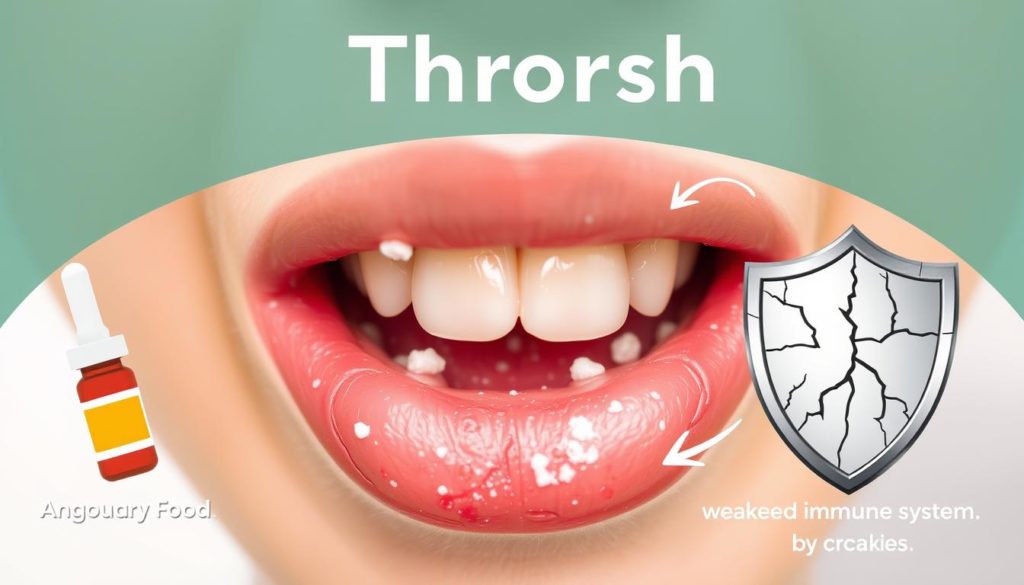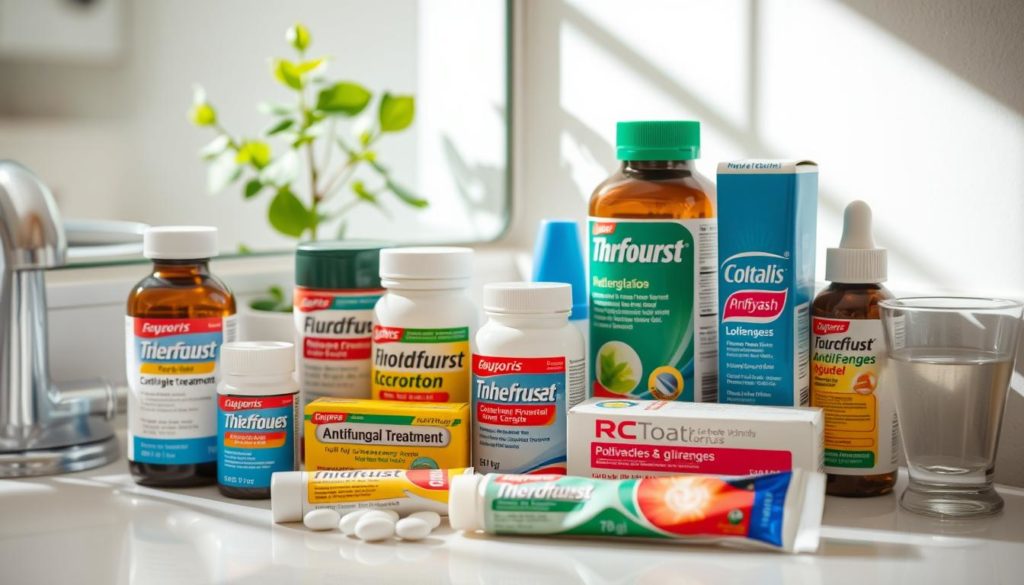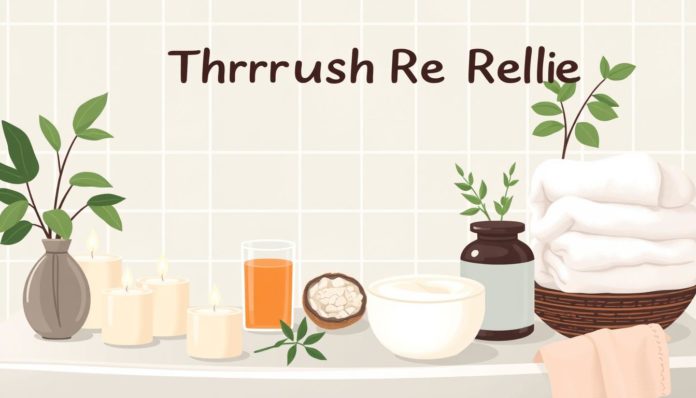Did you know that over 200,000 cases of oral thrush occur in the United States each year? This infection leads to creamy white lesions on the tongue or inner cheeks. It can cause discomfort and make eating hard. Getting fast relief from thrush is critical to avoid more problems. You can do this through good oral hygiene, antifungal medicines, or effective home cures. All these are ways to handle thrush treatment quickly.
If you’re dealing with oral thrush for the first time or often, knowing the best relief tips is key. These tips can hugely help.
Understanding Thrush: What Is It?
Thrush is often caused by Candida fungus growing too much. It happens when our immune system weakens or the mouth’s microorganisms are out of balance.

Causes of Thrush
Many things can lead to thrush. Thrush Causes are:
- Use of antibiotics
- Diabetes
- Poor oral hygiene
- Immune system disorders
Knowing about Thrush Causes helps us avoid it by controlling these risks.
Common Symptoms of Thrush
It’s important to spot Thrush Symptoms early for prompt treatment. Common Thrush Symptoms are:
- White patches in the mouth
- Redness and soreness
- Difficulty swallowing
- Cracked corners of the mouth
Seeing any of these Thrush Symptoms means you should see a doctor for the right treatment.
Effective Over-the-Counter Thrush Treatments
Addressing thrush early can help make symptoms go away faster. Over-the-counter options are easy for many with mild to moderate symptoms. This guide shows you the available treatments to help you pick the best one:
Topical Antifungals for Oral Thrush
For mild thrush, topical antifungals like clotrimazole and nystatin are often used. You can put these treatments right on the sore spot. They fight the infection there and lessen the discomfort.
- Clotrimazole: Comes in lozenges that dissolve in the mouth, delivering medication directly to the affected tissues.
- Nystatin: Available in both liquid form and lozenges, allowing flexible application options to suit your preference.

Oral Medications for Thrush
For worse thrush cases, doctors might suggest oral antifungal medications like fluconazole. These medicines fight the infection all over your body. They’re good for serious infections. It’s very important to finish all the medicine to fully get rid of the fungus and keep it from coming back.
Oral antifungal medications are usually for tough or serious thrush cases. If over-the-counter treatments don’t work, talk to a doctor. They can tell if you need these stronger medicines.
Home Remedies for Thrush Relief
Home remedies are a soothing and effective way to handle thrush. Looking for natural options? Here are some helpful methods.
Using Saltwater Rinses
Thrush Home Remedies often include saltwater rinses. Saltwater Rinses for Thrush make your mouth a tough place for Candida to live. Dissolve half a teaspoon of salt in a cup of warm water. Swish it around in your mouth for 15-20 seconds, then spit it out. Do this a few times a day for the best effect.
Applying Coconut Oil
Coconut Oil is great against thrush because of its antifungal traits. Put coconut oil on the thrush spots inside your mouth. You can either apply a bit directly or use it as a mouth rinse for around 30 seconds before spitting it out.
Probiotic Supplements
Probiotics can also help with thrush. They bring back a healthy balance of bacteria in your mouth. This makes it hard for Candida to grow. Try a high-quality probiotic supplement or eat foods like yogurt that have a lot of probiotics.
- Saltwater Rinses: They help reduce symptoms and control the infection with Saltwater Rinses for Thrush.
- Coconut Oil: It has natural antifungal properties to fight off Candida.
- Probiotics: They support a healthy bacterial balance and reduce thrush growth.
| Remedy | Benefits | How to Use |
|---|---|---|
| Saltwater Rinses | Reduces symptoms and controls infection | Dissolve salt in warm water and rinse |
| Coconut Oil | Natural antifungal properties | Apply directly or use as a mouth rinse |
| Probiotics | Restores healthy bacterial balance | Take supplements or consume probiotic-rich foods |
Thrush in Adults: Key Points to Know
Thrush is a condition adults sometimes face due to the Candida fungus. It brings discomfort and irritation. Knowing the risk factors and how to prevent it is essential for staying healthy.
Risk Factors Specific to Adults
Adults can be more at risk for thrush due to certain factors. It’s important to know what these are:
- Smoking: Smoking harms oral health and can make thrush more likely.
- Denture Use: Not cleaning dentures properly or if they don’t fit right can cause thrush.
- Medical Conditions: Diseases like HIV, diabetes, and anemia weaken the immune system. This increases thrush risk.
Being aware of these risk factors can help you take steps to prevent thrush.
Prevention Tips for Adults
There are effective ways to stop thrush from developing:
- Maintain Good Oral Hygiene: Regular brushing and mouthwash use can keep fungus away.
- Reduce Sugar Intake: Eating less sugar stops Candida growth, slashing thrush risk.
- Manage Existing Health Conditions: Controlling diseases like diabetes is key in fighting off thrush.
- Regular Dental Visits: Going to the dentist often helps catch and prevent oral issues early, including thrush.
Following these tips can dramatically reduce the chances of getting adult thrush. It leads to better oral health and overall well-being.
| Risk Factors for Thrush | Prevention Tips |
|---|---|
| Smoking | Quit smoking; maintain oral hygiene |
| Denture Use | Ensure proper cleaning; get well-fitting dentures |
| Medical Conditions | Properly manage conditions like HIV and diabetes |
Thrush in Babies: Symptoms and Treatments
Thrush is a common issue in babies that worries new parents. It shows up as white spots in the baby’s mouth. These spots can make feeding times hard for your baby. Knowing the symptoms is crucial for Baby Thrush Treatment.
- White patches on the tongue, gums, inner cheeks, or roof of the mouth
- Redness or soreness inside the mouth
- Difficulty feeding or swallowing
- Fussiness or irritability during feedings
There are a few ways to treat Baby Thrush Treatment. Doctors often suggest using antifungal gels or drops in the mouth. It’s also key to keep anything the baby puts in their mouth clean. This includes pacifiers and bottles to help stop thrush from spreading.
- Follow the pediatrician’s instructions on applying antifungal treatments.
- Ensure proper sterilization of all feeding tools and toys.
- Maintain good oral hygiene by regularly cleaning the baby’s mouth even if there are no visible symptoms.
Quickly dealing with Thrush in Babies helps keep them comfortable and healthy. Always talk to your pediatrician if symptoms appear or treatments don’t work.
Healthy Habits to Prevent Thrush Recurrence
Preventing thrush from coming back is important. Good oral habits are key. They keep your mouth healthy and stop thrush from growing.
- Brush your teeth at least twice a day using a fluoride toothpaste.
- Floss daily to remove plaque and food particles between teeth.
- Avoid mouthwashes with alcohol, as they may disrupt the natural balance of your oral flora.
- Limit your intake of sugary foods and beverages, which can contribute to an environment where thrush can flourish.
- Incorporate yogurt or probiotic supplements into your diet to maintain a healthy oral microbiome.
- If you wear dentures, ensure they fit properly and remove them nightly for cleaning.
Here’s a quick guide for preventing thrush:
| Habit | Frequency | Reason |
|---|---|---|
| Brushing Teeth | Twice Daily | Removes plaque and prevents bacterial buildup |
| Flossing | Daily | Eliminates food particles that brushing may miss |
| Avoiding Alcohol-Based Mouthwash | Regularly | Prevents disturbance of the natural oral flora |
| Limiting Sugary Foods | Regularly | Reduces the risk of yeast overgrowth |
| Consuming Probiotics | Regularly | Supports a balanced oral microbiome |
| Cleaning Dentures | Nightly | Prevents contamination and bacterial buildup |
Add these habits to your daily life to keep your mouth healthy. This way, you can greatly reduce the risk of thrush coming back.
Thrush Diagnosis: When to See a Doctor
If your thrush symptoms don’t get better with home treatments, it’s time to think about visiting a doctor for thrush for a detailed check-up.
Diagnostic Procedures for Thrush
Your doctor will check your mouth carefully during a thrush diagnosis. They will use a tongue depressor to find white spots in your mouth and throat. If needed, they might take a sample from the area to test for Candida.
Medical Tests for Thrush
For severe or repeating infections, more thrush diagnostic tests may be necessary. These might include blood work or a complete blood count to find any health issues causing the infections.
Getting these extra tests helps in fully treating and managing thrush.
Natural Remedies vs. Prescription Medications for Thrush
Should you choose Natural Thrush Remedies or stick with Thrush Prescription Medications? Here’s what you need to know:
People often pick natural remedies like yogurt, apple cider vinegar, and tea tree oil for milder cases. These can offer relief. However, they might not always work. For example, yogurt could improve oral health but not tackle the infection. Apple cider vinegar fights fungi but may irritate some people.
In contrast, Thrush Prescription Medications like fluconazole and nystatin fight the infection directly. They are tested and reliable, particularly for tough cases. Yes, you need a prescription, but they provide consistent results.
Here’s a quick comparison:
| Natural Thrush Remedies | Thrush Prescription Medications |
|---|---|
| Accessibility: Over-the-counter | Accessibility: Prescription required |
| Effectiveness: Varies, not guaranteed | Effectiveness: Clinically proven |
| Usage: Self-administered | Usage: Directed by healthcare provider |
| Cost: Generally lower | Cost: May be higher, varies with insurance |
| Side Effects: Generally mild | Side Effects: Potential for stronger side effects |
Choosing between natural remedies and prescription meds for thrush depends on many things. This includes how serious the infection is and your overall health. Always talk to a healthcare provider for the best advice on your treatment plan.
Thrush: Addressing Common Misconceptions
Many people have the wrong idea about thrush, but knowing the truth is key for treating it right. A big myth is that only bad hygiene causes thrush. Even with great oral care, thrush can still happen. This is because things like antibiotics, weak immune systems, and diabetes can throw off your mouth’s yeast balance, leading to thrush.
It’s also not true that only babies and older people get thrush. In fact, anyone can get it. Stress, hormones, and some meds like corticosteroids or birth control can increase the risk. Knowing what triggers thrush is important for everyone, not just certain age groups.
Lastly, some think you can always spot thrush or feel its symptoms. But sometimes, thrush can be mild or show no symptoms, making it tricky to notice and treat. If you’re having mouth discomfort, white patches, or soreness, get checked for thrush. Clearing up these myths helps people get the right treatment on time.
FAQ
What is thrush and what causes it?
Thrush is called oral candidiasis too. It happens because of the Candida fungus. Things like antibiotic use, having diabetes, weakened immune systems, and not taking care of your mouth can cause it.
What are the common symptoms of thrush?
If you have thrush, you might see white spots on your tongue or cheeks. Other signs are feeling sore, having trouble swallowing, and having cracked mouth corners.
How can I get quick relief from thrush?
Fighting thrush fast means keeping your mouth clean, taking antifungal medicine, and trying some home cures. It’s key to treat it quick to dodge worse troubles.
What are some effective over-the-counter treatments for thrush?
For thrush, you can get creams like clotrimazole and nystatin without a prescription. If it’s really bad, you might need fluconazole pills, but a doctor has to say okay first.
Are there any home remedies that can help with thrush?
Sure, using saltwater, coconut oil, and probiotics can soothe thrush symptoms. They offer natural ways to tackle the infection.
What are the risk factors for thrush in adults?
Adults might get thrush from smoking, wearing false teeth, or having certain health problems like HIV. Good mouth care and handling these risk elements can stop thrush.
How is thrush treated in babies?
Antifungal treatments work for babies’ thrush. Keep things clean that babies often put in their mouths to stop thrush.
How can I prevent thrush from recurring?
Stop thrush from coming back by brushing and flossing a lot, choosing the right mouthwash, and eating less sugar and yeast. Also, take good care of any dentures.
When should I see a doctor for thrush?
See a doctor if home cures don’t beat thrush. They might check your mouth or test for Candida. Get checked out for bigger health issues if it keeps coming back or gets bad.
What are the differences between natural remedies and prescription medications for thrush?
Natural fixes like yogurt and tea tree oil can ease mild thrush. But, tough or tricky cases often need medicine from the doctor. Always check with a healthcare pro.
What are some common misconceptions about thrush?
People wrongly think only babies and old people get thrush or that it’s all about being dirty. Really, anyone can get it for lots of reasons, including certain meds or health issues.


